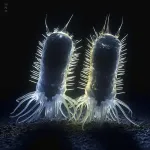(Press-News.org) Plant biologist Alex Harkess, PhD, and his lab at HudsonAlpha Institute for Biotechnology are on a mission to change the future of food and fiber crops, one flowering plant species at a time. Much of plant breeding and global food production relies on the pollination of flowers to produce fruits that are eaten and used to produce further progeny. This process might sound straightforward, but it is actually complicated by the fact that some flowers contain only male or female reproductive organs, others contain both (hermaphrodites), and some can even switch sexes.
How flowers become male, female, or hermaphroditic is a complex phenomenon. Although not completely understood, it is imperative for crop breeding programs looking to create food and fiber crops better adapted to changing environmental pressures. This is especially true in crop species where one plant sex is more valuable than the other, like female hops that produce cones used in the beer industry, male asparagus plants that live longer in fields, and hermaphroditic papaya fruits that taste better than female fruits.
While the exact mechanism of sex determination is a mystery in many species, it is widely accepted that genetics plays a major role. Dr. Harkess and the members of his lab are experts at using genomics to understand plant reproduction and the genes that control sex in flowers. Sex-determination genes have only been concretely defined in five plant species, with Harkess playing a critical role in their identification in asparagus.
Last year, Harkess was awarded a prestigious National Science Foundation (NSF) CAREER grant to characterize sex chromosomes and sex-determining genes across every order of flowering plants. Continuing that momentum, HudsonAlpha, and their collaborators New West Genetics, were recently awarded a United States Department of Agriculture National Institute of Food and Agriculture (USDA-NIFA) grant that aims to unlock the full potential of industrial hemp, a versatile plant used for centuries for a wide variety of purposes.
New West Genetics is a global leader in creating premium, stable hemp seed genetics that are trait enhanced for sustainability, food, feed, and fiber applications. For ten years running, the company has built a commercial-scale breeding program across the US and Canada. Applying prior experience from crops like hybrid canola, maize, sorghum, and wheat, the team combines traditional breeding, modern genomics, and agronomic expertise to create non-GMO, proprietary hemp seed bred for multiple markets.
The growing industrial hemp market
Hemp (Cannabis sativa) is an annual flowering plant indigenous to Eastern Asia. It has been cultivated for centuries as a source of industrial fiber, seed oil, food, and medicine. Thanks to popular culture and social media, many people often confuse hemp with its botanical cousin, marijuana, because both are members of the Cannabis family. Unlike marijuana, hemp contains very low levels of tetrahydrocannabinol (THC), the psychoactive compound that produces a “high” when consumed.
Since hemp was commercially legalized in all 50 states with the passage of the 2018 Farm Bill, the supply chain and demand for grain and fiber products have been steadily building. In addition, ever-increasing data is being published on the higher sustainability marks hemp achieves, with its deep, massive root structure sequestering more carbon than typical row crops and its need for lower inputs and greater drought and pest resistance.
Hemp is widely recognized for its versatile industrial applications. Its long and durable fibers possess excellent moisture-wicking properties, making them ideal for textiles, building materials, bioplastics, animal bedding, and more. Additionally, hemp seeds are a valuable grain/oilseed crop, offering high levels of protein, healthy fats, and essential nutrients. It is most comparable to the nutrition profile of soy, though its oils are much more nutritious. Hemp seed oil, rich in omega-3 and omega-6 fatty acids, can be used in various edible oil and protein products. This outstanding oil profile, coupled with NWG’s AMPLIFY™ trait, makes it an economically viable candidate for sustainable fuels.
NWG AMPLIFY™, the first commercial, scalable hemp hybrid, genetically skews the sex ratio from its average ancestral ratio of 50:50 female to male to a 90:10 female-to-male ratio. This shift, together with hybrid vigor, results in double the amount of grain and flower yield and more vigor and uniformity overall.
“NWG AMPLIFY changes the economic dynamics of hemp production, particularly for the grain side,” said Wendy Mosher, New West Genetics CEO. “With double yields of healthy lipids and proteins, we can compete with the economics of soy but with greater carbon sequestration. AMPLIFY enables farmers, ingredient manufacturers, and sustainable fuels processors to adopt a new rotational option that is a much more preferred product by today’s consumers, who express strong preferences for the nutritional value and sustainability of the food they consume.”
Breeding better industrial hemp for a sustainable source of fiber, proteins, and oil
Hemp is dioecious, having separate male and female sexes. Female hemp plants are typically larger in stature than males and produce more biomass, increasing the yield of hemp fiber per acre. In addition, only female flowers produce seeds that contain high levels of healthy lipids and proteins. For these reasons, hemp breeders want a high percentage of female plants growing in their fields.
Hemp has an XY sex-determination system, where females have two X chromosomes, and males have an X chromosome and a Y chromosome. Like most XY systems, hemp generally reproduces at a 50:50 male: female ratio. Because the mechanics by which sex is determined in hemp are unknown, breeders currently feminize hemp plants using chemicals to create progeny that is predominantly female. Feminized plants do not make fertile seeds, so the process must be repeated each season. Understanding the genetic mechanism by which plants become male or female would enable genomics-assisted breeding of more female plants without adding chemicals.
Through their recently awarded USDA NIFA grant, Harkess and his lab aim to build five high-quality hemp genomes that will be used to identify and analyze the hemp sex chromosome pairs. Plant sex chromosomes are hard to identify and difficult to assemble because they differ entirely from species to species. The Harkess lab developed a pipeline called Cytogenetics-by-Sequencing (CBS) to more easily and inexpensively identify and characterize sex chromosomes in plants. They have successfully used the CBS pipeline on nearly 30 dioecious plant and even animal species so far.
“Separate male and female sexes have evolved hundreds if not thousands of times in plants, and finding the genes that control sex determination is so challenging because most plants do it very differently from each other,” said Harkess. “These genes are found on sex chromosomes, which are also the most challenging chromosomes to sequence and assemble in plants. However, with HudsonAlpha’s historical expertise in plant genome sequencing, we are now able to reveal the full complexity of sex chromosomes in species like hemp and finally narrow in on the genes that control this agriculturally and economically valuable trait.”
Using CBS to interrogate the hemp sex chromosomes will allow Harkess and his lab to identify the master sex determination genes in hemp, which can be modified to control sex and increase the proportion of female plants, leading to a higher yield of fiber, oil, and protein. Breeding more female hemp plants will increase the yield and quality of hemp fiber, grain, and oil crops, making it a sustainable and valuable crop for farmers and consumers alike.
“Gaining greater understanding of the genomic basis for gender will be a powerful tool for improving the germplasm,” said John McKay, NWG CTO, and professor of plant genetics at Colorado State University. “We also are curious to see if these discoveries could be instructive for male/female breeding targets in other species, both plant and animal. Working with HudsonAlpha on this grant will be exciting and result in quality research with solid commercial applications.”
This work is supported by the USDA National Institutes of Food and Agriculture under grant number 2023-67013-39620.
END
Using genomics to unlock the full potential of industrial hemp
HudsonAlpha and New West Genomics collaborate on USDA NIFA grant to use genomics to help improve a sustainable source of fiber, protein, and oil
2023-06-07
ELSE PRESS RELEASES FROM THIS DATE:
MD Anderson Research Highlights for June 7, 2023
2023-06-07
HOUSTON ― The University of Texas MD Anderson Cancer Center’s Research Highlights showcases the latest breakthroughs in cancer care, research and prevention. These advances are made possible through seamless collaboration between MD Anderson’s world-leading clinicians and scientists, bringing discoveries from the lab to the clinic and back.
Recent developments include a molecularly driven Phase I trial of the ATR inhibitor camonsertib, an artificial intelligence model to predict immunotherapy responses in lung cancer, an analysis of cognitive and functional outcomes following treatment ...
Comprehensive new report tackles food safety risks in the informal sector of developing countries
2023-06-07
Key messages
Despite ongoing structural changes, small-scale processors, grocers, market vendors and food service operators dominate the food systems of most low- and lower middle-income countries;
Unsafe food is widespread in informal food distribution channels, having national public health implications;
Very few countries have coherent strategies for tackling food safety risks in the informal sector;
Most of the policy attention and resources now devoted to domestic food safety in the developing world focuses on strengthening ...
Exposure to “forever chemicals” during pregnancy linked to increased risk of obesity in kids
2023-06-07
PROVIDENCE, R.I. [Brown University] — The risks of exposure to “forever chemicals” start even before birth, a new study confirms, potentially setting up children for future health issues.
Exposure to per- and polyfluoroalkyl substances (PFAS) during pregnancy was linked to slightly higher body mass indices and an increased risk of obesity in children, according to a new Environmental Health Perspectives study led by Brown University researchers.
While this link has been suggested in previous research, the data has been inconclusive. The new study, which was funded by the Environmental Influences on Child Health Outcomes program ...
Parker Solar Probe flies into the fast solar wind and finds its source
2023-06-07
NASA's Parker Solar Probe (PSP) has flown close enough to the sun to detect the fine structure of the solar wind close to where it is generated at the sun's surface, revealing details that are lost as the wind exits the corona as a uniform blast of charged particles.
It's like seeing jets of water emanating from a showerhead through the blast of water hitting you in the face.
In a paper to be published this week in the journal Nature, a team of scientists led by Stuart D. Bale, a professor of physics at the University of California, Berkeley, and James Drake of the University of Maryland-College ...
Use of wearable devices in individuals with or at risk for cardiovascular disease
2023-06-07
About The Study: Among individuals with or at risk for cardiovascular disease, fewer than 1 in 4 use wearable devices, with only half of those reporting consistent daily use, according to the results of this study based on a nationally representative sample of U.S. adults in 2019 and 2020. As wearable devices emerge as tools that can improve cardiovascular health, the current use patterns could exacerbate disparities unless there are strategies to ensure equitable adoption.
Authors: Rohan Khera, M.D., M.S., of the Yale School of Medicine in New Haven, Connecticut, is the corresponding author.
To ...
What does ChatGPT say when you tell it you were sexually assaulted, you’re suicidal, or want to quit smoking?
2023-06-07
La Jolla, Calif. (June 5, 2023) — What does ChatGPT say when you tell it you were sexually assaulted, want to commit suicide, or are trying to quit smoking?
A new study published in JAMA Network Open led by John W. Ayers, Ph.D., from the Qualcomm Institute within the University of California San Diego, provides an early look into how artificially intelligent (AI) assistants could help answer public health questions.
Already, hundreds of millions use AI assistants like ChatGPT, and it will change the way the public accesses information. Given the growth of AI assistant use, the scientific team evaluated ...
Scientists discover ‘lost world’ of early ancestors in billion-year-old rocks
2023-06-07
The discovery of a “lost world” of ancient organisms that lived in Earth’s waterways at least 1.6 billion years ago could change our understanding of our earliest ancestors.
Known as the ‘Protosterol Biota’, these microscopic creatures are part of a family of organisms called eukaryotes. Eukaryotes have a complex cell structure that includes mitochondria, known as the “powerhouse” of the cell, and a nucleus that acts as the “control and information centre”. ...
Remains of an extinct world of organisms discovered
2023-06-07
Newly discovered biomarker signatures point to a whole range of previously unknown organisms that dominated complex life on Earth about a billion years ago. They differed from complex eukaryotic life as we know it, such as animals, plants and algae in their cell structure and likely metabolism, which was adapted to a world that had far less oxygen in the atmosphere than today. An international team of researchers, including GFZ geochemist Christian Hallmann, now reports on this breakthrough for the field of evolutionary geobiology in the journal Nature.
The previously unknown “protosteroids” were ...
Scientists discover ‘lost world’ of our early ancestors in billion-year-old rocks
2023-06-07
The newly discovered record of so-called protosteroids was shown to be surprisingly abundant throughout Earth´s Middle Ages. The primordial molecules were produced at an earlier stage of eukaryotic complexity – extending the current record of fossil steroids beyond 800 and up to 1600 million years ago. Eukaryotes is the term for a kingdom of life including all animals, plants and algae and set apart from bacteria by having a complex cell structure that includes a nucleus, as well as a more complex molecular machinery. “The highlight of ...
ChatGPT designs its first robot with TU Delft researchers
2023-06-07
Poems, essays and even books – is there anything the open AI platform ChatGPT can’t handle? These new AI developments have inspired researchers at TU Delft and the Swiss technical university EPFL to dig a little deeper: For instance, can ChatGPT also design a robot? And is this a good thing for the design process, or are there risks? The researchers published their findings in Nature Machine Intelligence.
What are the greatest future challenges for humanity? This was the first question that Cosimo Della Santina, assistant professor, and PhD student Francesco Stella, both from TU Delft, and Josie Hughes from EPFL, asked ...
LAST 30 PRESS RELEASES:
ACC announces inaugural fellow for the Thad and Gerry Waites Rural Cardiovascular Research Fellowship
University of Oklahoma researchers develop durable hybrid materials for faster radiation detection
Medicaid disenrollment spikes at age 19, study finds
Turning agricultural waste into advanced materials: Review highlights how torrefaction could power a sustainable carbon future
New study warns emerging pollutants in livestock and aquaculture waste may threaten ecosystems and public health
Integrated rice–aquatic farming systems may hold the key to smarter nitrogen use and lower agricultural emissions
Hope for global banana farming in genetic discovery
Mirror image pheromones help beetles swipe right
Prenatal lead exposure related to worse cognitive function in adults
Research alert: Understanding substance use across the full spectrum of sexual identity
Pekingese, Shih Tzu and Staffordshire Bull Terrier among twelve dog breeds at risk of serious breathing condition
Selected dog breeds with most breathing trouble identified in new study
Interplay of class and gender may influence social judgments differently between cultures
Pollen counts can be predicted by machine learning models using meteorological data with more than 80% accuracy even a week ahead, for both grass and birch tree pollen, which could be key in effective
Rewriting our understanding of early hominin dispersal to Eurasia
Rising simultaneous wildfire risk compromises international firefighting efforts
Honey bee "dance floors" can be accurately located with a new method, mapping where in the hive forager bees perform waggle dances to signal the location of pollen and nectar for their nestmates
Exercise and nutritional drinks can reduce the need for care in dementia
Michelson Medical Research Foundation awards $750,000 to rising immunology leaders
SfN announces Early Career Policy Ambassadors Class of 2026
Spiritual practices strongly associated with reduced risk for hazardous alcohol and drug use
Novel vaccine protects against C. diff disease and recurrence
An “electrical” circadian clock balances growth between shoots and roots
Largest study of rare skin cancer in Mexican patients shows its more complex than previously thought
Colonists dredged away Sydney’s natural oyster reefs. Now science knows how best to restore them.
Joint and independent associations of gestational diabetes and depression with childhood obesity
Spirituality and harmful or hazardous alcohol and other drug use
New plastic material could solve energy storage challenge, researchers report
Mapping protein production in brain cells yields new insights for brain disease
Exposing a hidden anchor for HIV replication
[Press-News.org] Using genomics to unlock the full potential of industrial hempHudsonAlpha and New West Genomics collaborate on USDA NIFA grant to use genomics to help improve a sustainable source of fiber, protein, and oil





